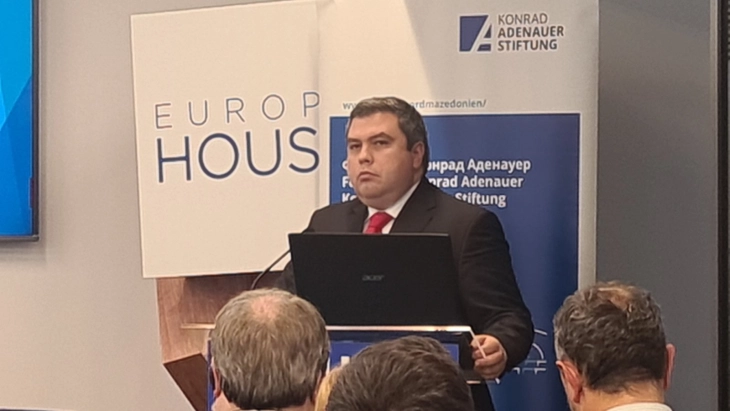Marichikj: Did everything apart from constitutional changes, reforms will be less successful if situation continues
- Up until last week we accomplished all necessary steps apart from the constitutional amendments. The question is how to solve the issue so that we aren’t in a situation where an additional 10 percent of citizens stop believing in the EU next year, said Deputy Prime Minister for European affairs, Bojan Marichikj, in his address at Monday’s promotion of “Analysis of public opinion on North Macedonia’s access to the European Union (2014 – 2023)” and “EU integrations in the shadow of the internal processes – Public opinion analysis for 2023” organized by the Institute for Democracy “Societas Civilis” – Skopje and the Konrad Adenauer Foundation.

Skopje, 18 December 2023 (MIA) – Up until last week we accomplished all necessary steps apart from the constitutional amendments. The question is how to solve the issue so that we aren’t in a situation where an additional 10 percent of citizens stop believing in the EU next year, said Deputy Prime Minister for European affairs, Bojan Marichikj, in his address at Monday’s promotion of “Analysis of public opinion on North Macedonia’s access to the European Union (2014 – 2023)” and “EU integrations in the shadow of the internal processes – Public opinion analysis for 2023” organized by the Institute for Democracy “Societas Civilis” – Skopje and the Konrad Adenauer Foundation.
“We’ve been stating since June that apart from Ukraine and Moldova, there will also be a decision for us to open Cluster 1 and hold the new intergovernmental conference, if we accomplish the necessary steps. Up until last week we accomplished everything apart from the constitutional amendments. We concluded the screening process, the consultation over the findings is ongoing and I believe it will conclude successfully,” said Marichikj.
The Deputy PM stressed that the screening process was also praised by the European Commission in the Report, but noted that it is the most the country can do without further political decisions in Parliament. He said the agreement between North Macedonia and Bulgaria is a part of the good-neighborly relations, but, he said, it is not a condition for the next stage of the negotiations – “the condition,” he said, “are the constitutional amendments”.
“In terms of the Report, I don’t and have never seen it as a document that should provide some kind of verdict. It is an assessment and an overview of affairs at the moment, especially since at this moment, apart from the Report, we are lucky to also have a screening report on the first cluster which analyzes both the positives and the shortcomings much more thoroughly. We should make an effort to remove the bilateral issue from the table, because there is a false dilemma, which is also present in the survey, and it’s whether our EU membership depends on bilateral issues or on the reforms – it depends on both,” added Marichikj.
If the situation continues, according to the Deputy PM, the country will have less success with the reforms.

The Chair of Parliament’s Committee on European Affairs, Arber Ademi, said all politicians and political parties are responsible for the decline in the citizens’ support for EU membership. He is adamant that there is no alternative to the adoption of the constitutional amendments.
“I also don’t want to go through this process of constitutional amendments, but what is the alternative? There is no alternative. I think the political parties and we, the politicians, are most responsible for the fact that the citizens’ support for EU membership is only 60 percent. The findings of this survey should be seriously reviewed by all institutions and by the Government, Parliament, and the Committee on European Affairs,” added Ademi.

According to the Chair of the National European Integration Council, Aleksandar Nikoloski, the most worrying finding from the survey is that young people are the most Eurosceptic.
“The young generation probably sees things much more clearly. Almost 90 percent believe they would move out either way, which can put Macedonia in the worst situation – seeing EU membership as an opportunity for easier emigration from the country. Something that also happened to Croatia recently, previously to Bulgaria, Romania, Poland,” said Nikoloski.
According to Nikoloski, the fundamental reason why the country hasn’t begun its membership negotiations is the high level of crime and corruption, as well as the principle of impunity.
“There was a rush to sign the Prespa Agreement on June 17, because on June 29 the European Council held a meeting during which Macedonia was supposed to receive a date for negotiations, but Macedonia didn’t receive a date, instead it received three tasks that are still yet to be realized. The first is reform of the security structures, which never happened in practice; the second task was public administration reform, which is becoming increasingly less efficient; and the third task was the fight against crime and corruption. These three tasks are continuously not being implemented, but agreements are being signed according to the principle ‘we will sign whatever you want, just don’t touch us on domestic affairs’, and this has led us to a situation in which our neighbors come up with any conditions they want,” added Nikoloski.
According to the survey carried out by the Institute for Democracy "Societas Civilis" – Skopje, the level of support for EU membership is the lowest it has ever been. Euroscepticism isn’t on the rise, but a big chunk of the population remains undecided on whether the country should pursue EU membership.
Photo: MIA







